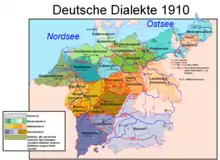Low Prussian dialect
Low Prussian (German: Niederpreußisch), sometimes known simply as Prussian (Preußisch), is a moribund dialect of East Low German that developed in East Prussia. Low Prussian was spoken in East and West Prussia and Danzig up to 1945. In Danzig it formed the particular city dialect of Danzig German. It developed on a Baltic substrate through the influx of Dutch- and Low German-speaking immigrants. It supplanted Old Prussian, which became extinct in the 17th century.
| Low Prussian | |
|---|---|
| Region | |
| Ethnicity | Germans (Prussian and Saxon subgroups) |
| Dialects | |
| Language codes | |
| ISO 639-3 | – |
| Glottolog | lowe1387 |
 German dialects about 1910, Low Prussian (Niederpreußisch) marked in the northeast | |
Plautdietsch, a Low German variety, is included within Low Prussian by some observers. Excluding Plautdietsch, Low Prussian can be considered moribund due to the evacuation and forced expulsion of Germans from East Prussia after World War II. Plautdietsch, however, has several thousand speakers throughout the world, most notably in South America, Canada and Germany.
Simon Dach's poem Anke van Tharaw was written in Low Prussian.
Vocabulary
According to one summary of Low German dialects, words very characteristic of Low Prussian are doa ('dor', there), joa ('jo', yes), goah ('goh', go) and noa ('nober', neighbor), which feature the diphthong "oa" instead of the usual "o" or "a". The dialect is also marked by a loan of High German-like words, such as zwei ('twee', two). Words are often shortened, in a manner similar to that of the neighboring East Pomeranian dialect, giving beet (beten, little bit) and baakove ('bakåben', bake oven).
Some observers argue that it resembles Dutch and Flemish because of these features. Low Prussian also has a number of words in common with Plautdietsch, such as Klemp (cow), Klopps (lump, ball of earth), and Tsoagel (tail).
Some other words[1] are:
- Boffke - boy, lad
- dätsch - dumb
- Dubs - bum
- Gnaschel - little child
- jankere - yearn
- Kobbel - mare
- Pungel - pouch
- schabbere - talk
- Schischke - pine-cone
- Schucke - potato(es)
Varieties
- Übergangsmundart zum Ostpommerschen, transitional dialect with East Pomeranian
- Westliches Niederpreußisch
- Mundart des Weichselmündungsgebietes, around Danzig (Gdańsk)
- Mundart der Frischen Nehrung und der Danziger Nehrung, around the Vistula Lagoon
- Mundart der Elbinger Höhe, around Elbing (Elbląg)
- Mundart des Kürzungsgebiet(e)s or Kürzungsgebietsmundart, around Braunsberg (Braniewo) and Frombork
- Westkäslausch, around Mehlsack (Pieniężno)
- Ostkäslausch, around Rößel (Reszel)
- Natangisch-Bartisch, around Bartenstein (Bartoszyce)
- Westsamländisch, around Pillau (Baltiysk)
- Ostsamländisch, around Königsberg (Kaliningrad), Labiau (Polessk) and Znamensk (Wehlau)
- Mundart des Ostgebietes, around Insterburg (Chernyakhovsk), Memel (Klaipėda) and Sovetsk (Tilsit)
Low and Old Prussian
After the assimilation of the Old Prussians, many Old Prussian words were preserved within the Low Prussian dialect.
| Low Prussian | Old Prussian | Latvian | Lithuanian | Standard German | English |
|---|---|---|---|---|---|
| Flins | plīnksni | plācenis | blynas | Pfannkuchen | pancake, scone, biscuit |
| Kaddig | kaddegs | kadiķis | kadagys | Wacholder | juniper |
| Kurp | kurpi | kurpe | kurpė | Schuh | shoe |
| Kujel | kūilis | cūka, mežacūka, kuilis | kuilys, šernas | Wildschwein | boar |
| Margell, Marjell | mērgā | meitene, meiča | merga, mergelė, mergaitė | Magd, Mädchen, Mädel | maiden, girl |
| Paparz | papartis | paparde | papartis | Farn | fern |
| Pawirpen | (from pawīrps) | algādzis, strādnieks | padienis | Losmann | freelancer |
| Zuris | sūris | siers | sūris | Käse | cheese |
Low Prussian and Lithuanian
In addition to the words of Old Prussian origin, another source of Balticisms was Lithuanian. After the migration of Lithuanians in the 15th century, many Lithuanian loanwords appeared in the Low Prussian dialect.
| Low Prussian | Lithuanian | Standard German | English |
|---|---|---|---|
| Alus | alus | Bier | beer, ale |
| Burteninker | burtininkas | Wahrsager, Zauberer, Besprecher | magician, soothsayer, sorcerer |
| kalbeken | kalbėti | sprechen | to talk, to speak |
| Kausche, Kauszel | kaušas | Schöpfkelle, Trinknapf | dipper |
| Krepsch, Krepsche, Krepsze | krepšys, krepšas | Sack, Handsack, Ranzen | basket |
| Lorbas | liurbis | Tölpel, Tolpatsch, Waschlappen | loser, fumbler |
| Packrant | krantas, pakrantė, pakraštys | Rand, Küste | edge, coast |
| Pirschlis | piršlys | Brautwerber | matchmaker |
| Wabel, Wabbel | vabalas | Käfer | bug |
References
- Found in Riemann, Erhard (ed.): Preußisches Wörterbuch, Vol. 1, Issue 1. Neumünster (Wachholtz) 1974.
- Thorwald Poschenrieder, in: Deutsch-litauische Kulturbeziehungen. Kolloquium zu Ehren von August Schleicher an der Friedrich-Schiller-Universität Jena vom 19. bis 20. Mai 1994. Herausgegeben von Gertrud Bense, Maria Kozianka, Gottfried Meinhold. Jena, 1995, p. 130 (having: Westliches Niederpreußisch, Kürzungsgebietsmundart, Westkäslausch, Natangisch-Bartisch, Westsamländisch, Ostsamländisch, Mundart des Ostgebietes, Ostkäslausch)
Bibliography
- Bauer, Gerhard: Baltismen im ostpreußischen Deutsch: Hermann Frischbiers „Preussisches Wörterbuch“ als volkskundliche Quelle. In: Annaberger Annalen, Nr. 13, 2005, p. 5-82.
- Mitzka, Walther. Grundzüge nordostdeutscher Sprachgeschichte. (= DDG 59) Marburg (Elwert) 1959
- Riemann, Erhard. Die preußische Sprachlandschaft. In: Festschrift für Friedrich von Zahn Bd. 2 Köln/Wien 1971, 1-34
- Riemann, Erhard (Hrsg.). Preußisches Wörterbuch. Bd. 1, Lf. 1. Neumünster (Wachholtz) 1974
- Ziesemer, Walther. Die ostpreußischen Mundarten. Proben und Darstellungen. Breslau 2005
External links
- "Plautdietsch-Freunde e. V. - Die Website des Vereins der Plautdietsch-Freunde in Deutschland". Plautdietsch-freunde.de. Retrieved 1 December 2017.